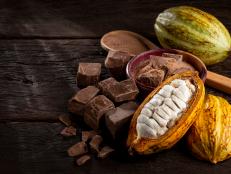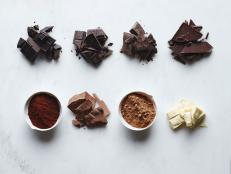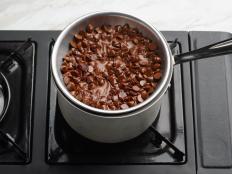This Week's Nutrition News Feed

In this week's news: Doctors embrace the food-as-medicine concept; chocolate is awesome for a whole new reason; and saturated fat (slowly) comes back into the fold.
Last weekend,the Napa Valley branch of the Culinary Institute of America hosted hundreds of physicians for a medical meeting involving kitchen aprons, not lab coats. The draw was the Healthy Kitchens/Healthy Lives conference, co-sponsored by the Harvard School of Public Health and part of a quickly growing trend of culinary-medical cross-pollination. Come May, for example, Tulane University will debut the country's first teaching kitchen affiliated with a medical school. In New York, meanwhile, celebrity chefs David Bouley and Seamus Mullen have been working with doctors Mark Hyman and Frank Lipman, respectively, to develop menu items and eating philosophies representing a drool-worthy intersection of pantry and pharmacy. (Wild mushrooms with white truffle, sweet garlic, grilled toro and coconut foam, anyone?) Fueling the trend is some pretty delicious research: In one recent study of a nonprofit program, patients whose doctors wrote them "prescriptions" to redeem at local farmers markets saw their BMI drop by an average of 37.8% in a single year.
Earlier this week, a group of Louisiana State University scientists reported that the millions of good bacteria in our guts seem to have a real predilection for cocoa powder. The friendly microbes appear to transform the cocoa into compounds that are good for our hearts, help stave of inflammation and even help us know we're full. Although more study is needed, researchers believe that the polyphenol antioxidants and fiber in chocolate are being broken down by the gut bacteria in a way that makes them easier for our bodies to absorb. The key, as always, is to stick to dark chocolate (above 70% cocoa content is optimal).
Want to improve your race time? Try a cup of coffee. Okay, four. Once you stop twitching, you'll be golden. According to 21 studies on caffeine in timed performance, the substance can -- at the right dose -- yield as much as a 3 percent improvement in performance time. That may sound small, but translated to, say, a 10-hour triathlon, it's 18 minutes shaved off the total time. That much caffeine is, of course, no joke: It's the rough equivalent of six 8-ounce Red Bulls. These, and other strangely absorbing facts are the topic of Murray Carpenter’s new book, Caffeinated: How Our Daily Habit Helps, Hurts, and Hooks Us, which is excerpted this week on The Atlantic Health blog.
Steak, butter, cheese -- for decades we’ve been told to keep indulgences like these off our plates, thanks to their high saturated fat content. This week, however, a new study involving over half a million people challenged that advice. Published in the Annals of Internal Medicine, it showed that individuals who ate higher levels of saturated fat suffered no more heart disease than those who ate low levels. Nor did those who consumed large amounts of unsaturated fat (like olive oil) experience any less disease than others. But experts warned against glomming on to, or shunning, any one nutrient group: "The single macronutrient approach is outdated. I think future dietary guidelines will put more and more emphasis on real food rather than giving an absolute upper limit or cutoff point for certain macronutrients," Dr. Frank Hu, a professor of nutrition and epidemiology at the Harvard School of Public Health, told the New York Times.
Sara Reistad-Long writes about science, wellness and lifestyle. She is the co-author of The Big New York Sandwich Book and can be followed on Twitter: @sarareistadlong
































